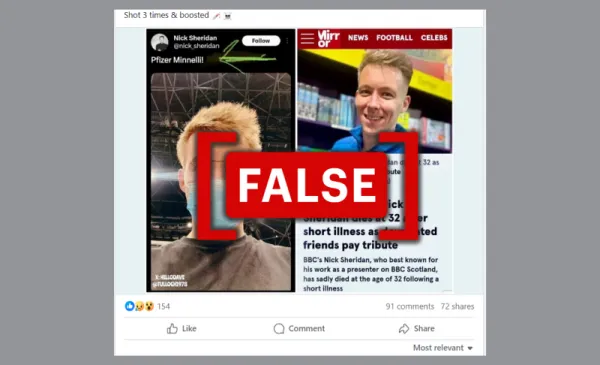By: Arron Williams
March 21 2024
There is no evidence BBC presenter Nick Sheridan's death is tied to the COVID-19 vaccine

The Verdict False
Nick Sheridan died after a "short illness," and there is no evidence that his death was caused by the COVID-19 vaccine.
Context
Following the death of BBC presenter Nick Sheridan, posts on Facebook, Instagram, and X (formerly Twitter) falsely claim that his death was caused by the COVID-19 vaccines.
One Facebook post states he was "Shot three times & boosted," referring to the vaccine. Another Instagram post shares a social media post from Sheridan in 2021 of him getting vaccinated with the hashtags "#vaccinedeaths #spikeprotein #genetherapy."
The BBC announced Sheridan's death at 32 on March 7, 2024. His funeral took place on March 13.
Screenshot of the Instagram post attributing Sheridan's death to the vaccines. (Source: Instagram)
Similarly, a post on X stated that he suffered from a brain aneurysm and "died suddenly" due to the vaccine.
In fact
There is no evidence that Nick Sheridan's death is related to the COVID-19 vaccine. The BBC stated that Sheridan died after a "short illness" but did not provide further details. There is no official announcement of his cause of death.
According to news organizations The Mirror and the Irish Independent, Sheridan died after a suspected brain aneurysm. The Mirror states that his colleagues revealed he collapsed while out running. However, there is no confirmation from the BBC that Sheridan suffered an aneurysm.
Posts from 2021 on Sheridan's X account suggest that he was vaccinated against COVID-19. One post reads "Pfizer Minneli!" while another reads "Jagged through a hedge backwards," with a syringe emoji. However, even if he was vaccinated, as these posts suggest, this does not correlate to the causation of his illness and death.
There is also no evidence, at the time of publishing, that COVID-19 vaccines cause brain aneurysms. The United States National Institute of Neurological Disorders and Stroke (NINDS) describes aneurysms as "a weak or thin spot on an artery in the brain that balloons or bulges out and fills with blood." According to NINDS, risk factors for brain aneurysms include hereditary factors, untreated high blood pressure, cigarette smoking, drug abuse, and being over the age of 40.
A Spokesperson from the U.S. Centers for Disease Control and Prevention (CDC) told Logically Facts, "Extensive research and safety monitoring has not established an association between COVID-19 vaccination and brain aneurysms."
The U.K. government's Medicines & Healthcare products Regulatory Agency (MHPRA) also told Logically Facts that "The Summary of Product Characteristics and patient information leaflets for COVID-19 vaccines list the possible risks which may be associated with these products. A brain aneurysm is not a listed side effect for any of the COVID-19 vaccines authorized in the U.K.
As with all vaccines and medicines, the safety of COVID-19 vaccines is continuously monitored, and we continue to keep emerging information under review."
Since the COVID-19 vaccine roll-out, anti-vaxxers frequently target the deaths of celebrities or public figures and attribute the cause of death to the vaccines. However, these claims are unfounded. Logically Facts has previously fact-checked similar claims about other celebrity deaths being linked to COVID-19 vaccinations and found them to be false.
The verdict
There is no evidence that Nick Sheridan's death was caused by the COVID-19 vaccines. Though an official cause of death has not been released, multiple news sources have reported Sheridan died due to an aneurysm. Worldwide health organizations, including the CDC and the MHPRA, report that there is no confirmed association between the COVID-19 vaccines and aneurysms. Therefore, we have marked this claim as false.


